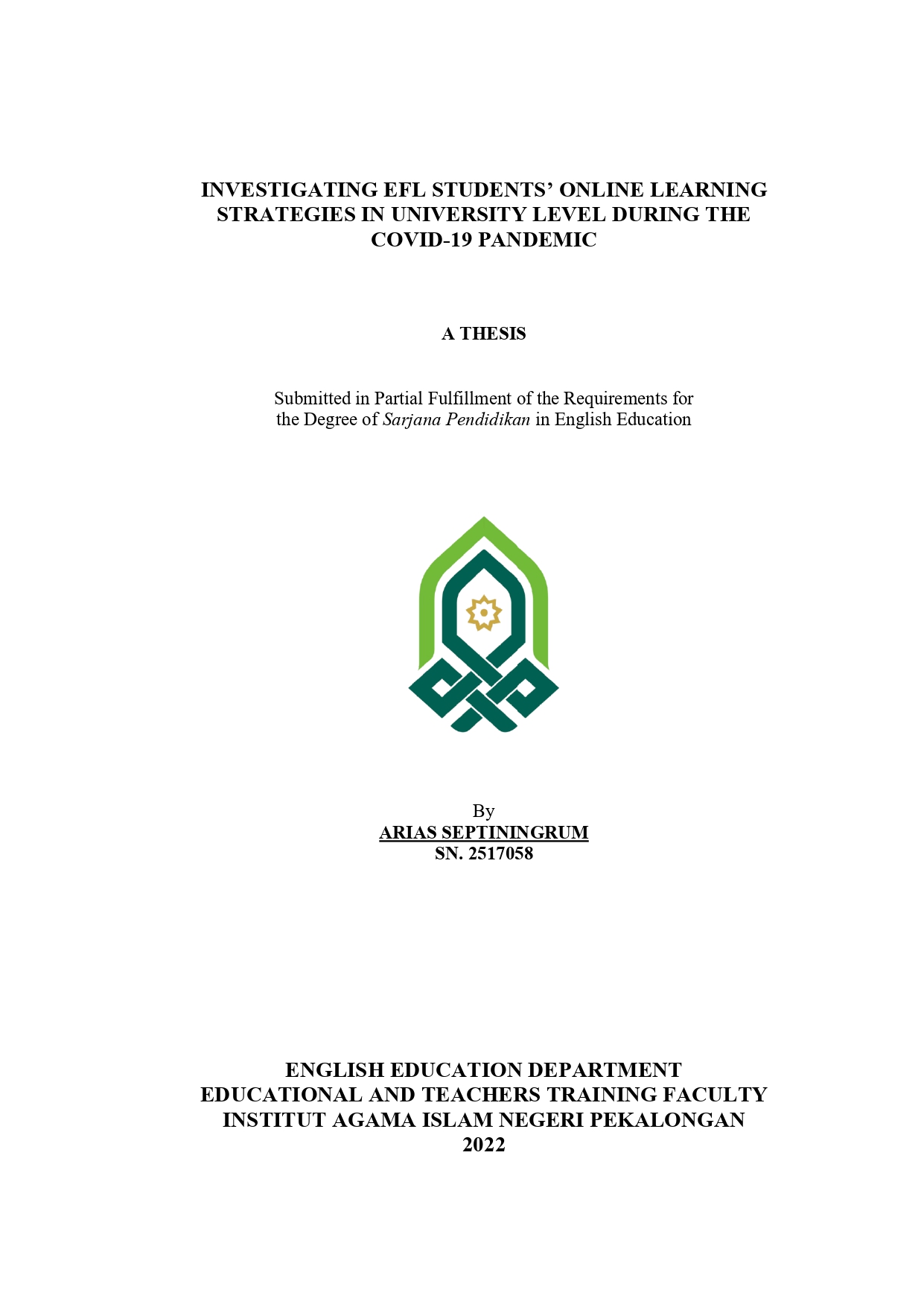
SKRIPSI TADRIS BAHASA INGGRIS
Investigating EFL Students' Online Learning Strategies in University Level During The Covid-19 Pandemic
This study was conducted to explore university students’ online learning strategies during measuring English as a foreign language (EFL) in pandemic situation. This study employed case study and used descriptive qualitative approach. The collection of the data were obtained from questionnaire and semi-structured interview to several students of English Department who have online learning experience in one of universities in Pekalongan, Indonesia. The collected data were analyzed by using four stages framework of Miles and Huberman for drawing the conclusion.The results showed that all of learning strategies during English online learning used by students were: Memory strategy, Cognitive strategy, Compensation strategy, Metacognitive strategy, Affective strategy, and Social strategy. The students combined direct and indirect LLS during online learning. The dominant strategy used by student were Cognitive strategy and Affective strategy. Morover, factors affecting students’ LLS used were: motivation, emotion, teaching learning method, situation of learning and social factor.
Keywords: EFL Students, online English learning, learning strategies, Covid-19 pandemic
REFERENCES
Abdi, S.,& Makiabadi, H. (2019). Learning Listening and Speaking through BBC VOA podcast: An App Review. University of Mashhad
Adams, William. 2015. Conducting Semi-Structured Interviews. George Washington University. DOI:10.1002/9781119171386.ch19
Ayu, L. P. (2016). YouTube Videos in Teaching Listening: The benefits in Experts’ Views. Research in English and Education Syiah Kuala University Banda Aceh.
Barruansyah, R. F. (2018). The Correlation Between Learning Styles, Language Learning Strategies, and English Learning Motivation of the Sixth Semester of STIBA Persada Bunda. Journal of English Academic, Vol. 5, No 1.
Chamot, A.U. (2004). Issues in Language Learning Strategy Research and Teaching. Electronic Journal of Foreign Language Teaching, 1(1), 14- 26
Coman, C., Tiru,L. G., Mesesan-SchmitzL., Stanciu, C., &Bularca, M. C. (2020).Online Teaching and Learning in Higher Education during the Coronavirus Pandemic: Students’ Perspective. MDPI Journal.
Creswell,J. W. (2012). Educational research: planning, conducting, and evaluating quantitative and qualitative research(4thed.).Pearson, doi: https://doi.org/10.1177/160940690600500405
Efriana, L. (2021). Problems of Online Learning during Covid-19 Pandemic in EFL Classroom and the Solution. JELITA, 2(1), 38-47. Retrieved from https://jurnal.stkipmb.ac.id/index.php/jelita/article/view/74
Ellis, Rod. (1995). The Study of Second Language Acquisition. Oxford, UK: Oxford University Press, 1994. vii + 824 pp. https://doi.org/10.5070/L461005209
Famularsih, S. (2020). Students’ Experiences in Using Online Learning Applications due to COVID-19 in English Classroom. Studies in Learning and Teaching, doi: https://doi.org/10.46627/silet.v1i2.40
Fauzia, R. A. (2018). Language Learning Strategies in Mastering Speaking Skill by the Students of SMK Muhammadiyah 1 Surakarta. Publication Article. Universitas Muhammadiyah Surakarta.
Ketersediaan
| 23SK2325043.00 | SK TI 23.043 ARI i | My Library (Lantai 3. Local Content) | Tersedia |
Informasi Detail
- Judul Seri
-
-
- No. Panggil
-
SK TI 23.043 ARI i
- Penerbit
- Pekalongan : Jurusan S-1 Tadris Bahasa Inggris FTIK UIN K.H. Abdurrahman Wahid Pekalongan., 2022
- Deskripsi Fisik
-
xiii, 34 hlm., 30 cm; Bibliografi: 35-37
- Bahasa
-
Inggris
- ISBN/ISSN
-
-
- Klasifikasi
-
371. 35
- Tipe Isi
-
-
- Tipe Media
-
-
- Tipe Pembawa
-
-
- Edisi
-
-
- Subjek
- Info Detail Spesifik
-
-
- Pernyataan Tanggungjawab
-
Arias Septiningrum (2517058)
Versi lain/terkait
Tidak tersedia versi lain
Lampiran Berkas
Komentar
Anda harus login sebelum memberikan komentar
 Karya Umum
Karya Umum  Filsafat
Filsafat  Agama
Agama  Ilmu-ilmu Sosial
Ilmu-ilmu Sosial  Bahasa
Bahasa  Ilmu-ilmu Murni
Ilmu-ilmu Murni  Ilmu-ilmu Terapan
Ilmu-ilmu Terapan  Kesenian, Hiburan, dan Olahraga
Kesenian, Hiburan, dan Olahraga  Kesusastraan
Kesusastraan  Geografi dan Sejarah
Geografi dan Sejarah